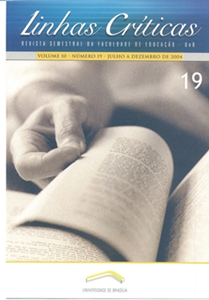Deficiência mental em sala de aula: para alem da naturalização de concepções e práticas
DOI:
https://doi.org/10.26512/lc.v10i19.3203Keywords:
Deficiência mental;, Perspectiva inclusiva;, Fracasso escolarAbstract
Os diferentes significados que a deficiência mental adquiriu através da história dependem da dinâmica da cultura. Este estudo tem por objetivo analisar as concepções de quatro professores sobre a inclusão de alunos com diagnóstico de deficiência mental na classe regular do ensino básico. Os dados foram obtidos por meio de entrevistas semi-estruturadas e organizados em grupamentos temáticos, considerando a frequência e a disponibilidade das significações. Os resultados indicaram que o conceito complexo de inclusão de alunos com diagnóstico de deficiência mental leve pode estar organizado a partir dos seguintes temas: Expectativas, Hipóteses, Diagnóstico, Funcionamento Psíquico, Políticas Públicas/Inclusão, Exclusão, Interação e Transição. Indicaram também que, no contexto da escola pesquisada, a deficiência mental adquire uma expressão que se traduz por concepções dirigidas ora para os processos de culpabilização da criança e/ou de sua família pelo fracasso escolar, ora para a necessidade de se desenvolver mecanismos mais adequados de procedimentos e avaliação pedagógicos.
Downloads
Downloads
Published
How to Cite
Issue
Section
License
Copyright (c) 2016 Linhas Críticas

This work is licensed under a Creative Commons Attribution 4.0 International License.
Authors who publish in this journal agree to the following terms:
-Authors maintains the copyright and grants the journal the right of first publication, the work being simultaneously licensed under the Creative Commons Attribution License which allows the sharing of the work with recognition of the authorship of the work and initial publication in this journal.
- Authors are authorized to enter into additional contracts separately, for non-exclusive distribution of the version of the work published in this journal (eg publish in institutional repository or as a book chapter), with acknowledgment of authorship and initial publication in this journal.
-Authorers are allowed and encouraged to publish and distribute their work online (eg in institutional repositories or on their personal page) at any point before or during the editorial process, as this can generate productive changes as well as increase the impact and the citation of published work (See The Effect of Free Access).



